Man's Cosmic Bonds: Iqbal's Insights on Universe, Nature, and Environment
The debate on man and nature is one that has been going on for many centuries. One should not be surprised that even today scientists and other researchers are still conducting studies in the area of man and nature. Before we go to the central theme of this essay on Iqbal, the authors would like to draw your attention to words like; universe, nature and environment. The clarification of these three entities is deemed important by the authors for the reason, that Muhammad Iqbal (1877-1938) states them in his Reconstruction (1996) and poems relating to his theory on personality development in man.
Many would agree that the three entities that refer to a reality that exists outside of man, are used interchangeably as if they meant to be the one and the same thing. It is important to state that although they are entities outside of man, nevertheless, man has to interact with them in order to fulfil the mission for which he has been sent to this world by Allah SWT. Being synonymous with one another, the three worlds only differ in their contextual use. To prove the case, when people hear the word universe, it is quite natural for them to imagine a sky above them laden with planets and billions of stars that illuminate the night sky. Having said that, we are pretty sure one will never be looking at the ground on which he/she is standing while thinking of the universe. Likewise, the word nature draws a mental picture in people's minds of the flora and fauna. Finally, the word environment draws people’s attention to the immediate surroundings in which they live.
With the abovementioned clarification on what is universe, nature and environment, let us explore Iqbal’s view on how man relates to the three entities. It is important to state here that, in Iqbal’s philosophical writings, the environment is normally referred to as the material world that tempts man with worldly riches and pleasure of all kinds. Besides that, the word environment also refers to the social environment that consists of people from all walks of life. It poses no surprise to an avid reader of Iqbal, that this great poet-philosopher of the Muslim world, emphasized a great deal on the sort of relationship man ought to have with the environment, otherwise referred to as the material world. He explained that man and his physical environment have a close-knit relationship. In this relationship, man and his environment struggle to dominate one another. Sometimes the environment would be able to penetrate the ego and weaken man, and at other times the ego would be able to defeat the environment and strengthen its position. In describing the tension that goes on between the ego and environment, and what sort of a position the ego should take, Iqbal (1996) said the following:
The life of the ego is a kind of tension caused by the ego invading the environment and the environment invading the ego. The ego does not stand outside this arena of mutual invasion. It is present in it as a directive energy and is formed and disciplined by its own experience (82).
In Iqbal’s idea, the call for man to conquer the material world is not a call meant for man to behave as a tyrant who recklessly plunders the wealth found in the belly of the earth, in the very core of the magnificent mountain, in the depth of the ocean, etc. What he really meant is that man should use his God-given intelligence in a just and systematic manner in managing the resources available in the physical world to attain his spiritual nearness to God. In managing the resources found in the physical world, man has to take serious consideration in the conservation and preservation of the bounties Allah has given to man. In order not to be misguided by his sense perception in witnessing, the gift of Allah in the physical world, man needs to be guided by his spiritual dimension to be just and fair in his manner and conduct. Guarded and guided by such principles, man would be able to utilize the wealth found in the physical world and at the same time, generously share it with his fellow human beings. The exact words of Iqbal (1996) on this matter are:
The naturalism of the Qur’an is only a recognition of the fact that man is related to nature, and this relation, in view of its possibility as a means of controlling her forces, must be exploited not in the interest of unrighteous desire for domination, but in the nobler interests of a free upward movement of spiritual life. In the interest of securing a complete vision of Reality, therefore, sense-perception must be supplemented by the perception of what the Qur’an describes as Fuad or Qalb, i.e. heart (12).
Further reading of Iqbal’s philosophy reveals that to him nature is not something that occupies the world materially. To him, like man, nature is also a handiwork of the Ultimate Self, through which He shows the ‘I-amness’. Metaphorically, he explained that nature to the Ultimate Self, is like what character is to man. In other words, nature can be seen as God’s creative activity otherwise known as God’s habit (Iqbal, 1996).
As such, the state of this relationship between man and his environment is one that is full of tension. In further elaborating his ideas on man and his environment, Iqbal pointed out that man has to subdue the demands of the environment in order to build a strong personality. On the contrary, man will have a weak personality when the human ego is defeated by the environment. Iqbal (1975) lucidly explained this tussle between the human ego and environment in his anthology of poems known as the Rumuz-i- Bekhudi:
Whoever conquers the world of matter
Can build a world out of a speck of dust!
The hills and the deserts, the rivers, the plains-
They are all means of education for those with a vision!
You, who have been put to sleep under opium’s narcotics;
Regard this world of cause and effect as contemptible!
Its real purpose is the expansion of the Muslim’s personality
And a testing of his hidden possibilities!
Conquer it, or it may conquer you
And hold you as the flagon holds the wine!
So that through the control of all its forces
Your manifold capacities may attain perfection!
So that man becomes the vicegerent of God,
Laying down the law for all the elements!
Dip your hands in the blood of the mountains,
Extract the bright pearls from the bosom of the sea!
Take from the Sun its bright luster,
And from the flood the lightning that illumines the palace!
Press intelligent into the services of your quest;
And conquer the world of the matter and the spirit!
He who controls the world of matter,
Can make lightning and heat into his chariot! (60).
In his philosophy and poetry, Iqbal also dealt with the subject of the universe. According to him, a Muslim in his spiritual growth and elevation should contemplate that the message of the Qur’an is the ‘Revealed Book’ from Allah, while the universe is the ‘Open Book’ of Allah. When referring to the universe, Iqbal linked it with science that can be employed as an instrument to explore the universe. To him, science is not an enemy of the spirituality of the Qur’an, but something that can enable Muslims to discover Allah's wonders in the universe. In addition, he believed that scientific data and findings most of the time complement religion and strengthen one’s faith. Besides his poems, in the Reconstruction (1996), Iqbal reiterated the role of science in strengthening one’s faith, when he said, “In our observation of nature, we are virtually seeking a kind of intimacy with the Absolute Ego; and this is only another form of worship” (45). “The scientific observer of nature is a kind of mystic seeker in the act of prayer” (73).
In his poems, Iqbal called upon the Ummah to utilize science to improve their lives by extracting the bounties that God has provided for them in the material world. Iqbal is of the opinion that man must use science and technology to bring out the hidden potentials from the belly of the earth to be utilized for his spiritual development. Conversely in the West, the coming age of science has taken the masses away from God and the Holy Scripture. In other words, science and scientists became the “newfound Gods” of the West. Unlike Western scholars, Iqbal did not over-glorify science. As much as he acknowledged the significant contributions of science, his emphasis on its importance did not go beyond other than as a tool for human survival and spiritual upliftment. The following lines from his poem candidly explain the role of science in human life:
Science is an instrument for the preservation of Life.
Science is a means of invigorating the Self.
Science and art are servants of Life (Iqbal, 1983:26).
In concluding this essay, it can be said with much confidence that Iqbal did not equate the universe and nature to God like what one reads in the Pantheist philosophy which says, “All is God and God is all”. His ideas are well grounded in what Allah says in the following verse of the Qur’an:
“Among His signs are the day and the night, the sun and the moon. Do not prostrate to the sun or the moon, but prostrate to Allah, Who created them ˹all˺, if you truly worship Him ˹alone˺”
(Al-Qur’an 41:37).
To Iqbal, like man, the universe and nature are creations of Allah. As such, the ideal thing for man to do with regard to the two is to bind a friendly coexistence with them. Doing that will be a rewarding thing for man to reap the many benefits from an unpolluted nature. Lastly, in Iqbal’s personality theory, defeating an environment in the form of a material world is one of the prerequisites for man to achieve a strong personality.
(Dr. Mohd Abbas Abdul Razak is Assistant Professor at Department of Fundamental & Inter-Disciplinary Studies, AHAS KIRKHS, IIUM.
Dr. Hayatullah Laluddin is Assistant Professor at Kulliyyah of Economics and Management Sciences, IIUM)
Reference:
Iqbal, Muhammad (1975) Iqbal in Bazm-i-Iqbal, (Vol. 22). (Lahore: Bazm-i-Iqbal, 1975), p. 60.
Iqbal, Muhammad. (1983). The secrets of the self (Asrar-i-Khudi). (Renold A. Nicholson, Trans.). Lahore: SH. Muhammad Ashraf.
Iqbal, Muhammad. (1996). The reconstruction of religious thought in Islam, Lahore: Institute of Islamic Culture.
Disclaimer
The views expressed in this article are the author’s own and do not necessarily mirror Islamonweb’s editorial stance.

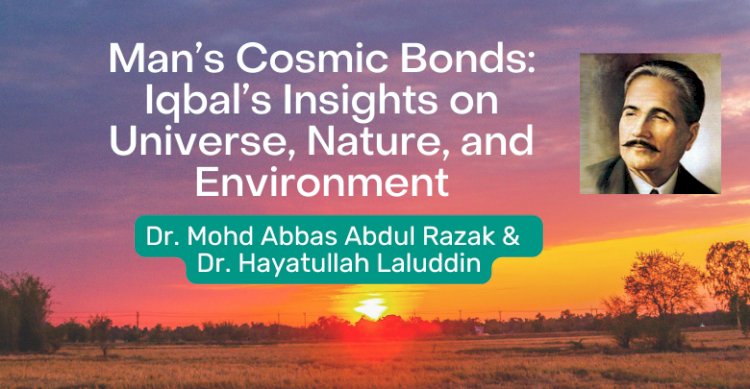


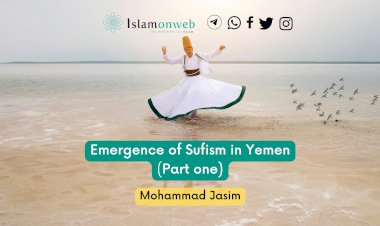
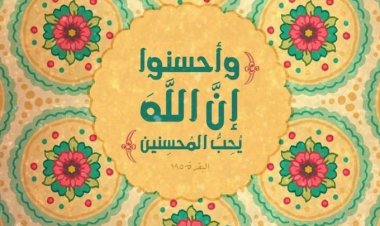

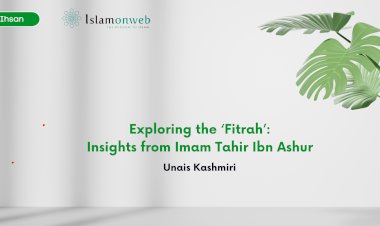
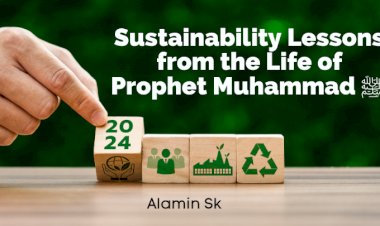















Leave A Comment